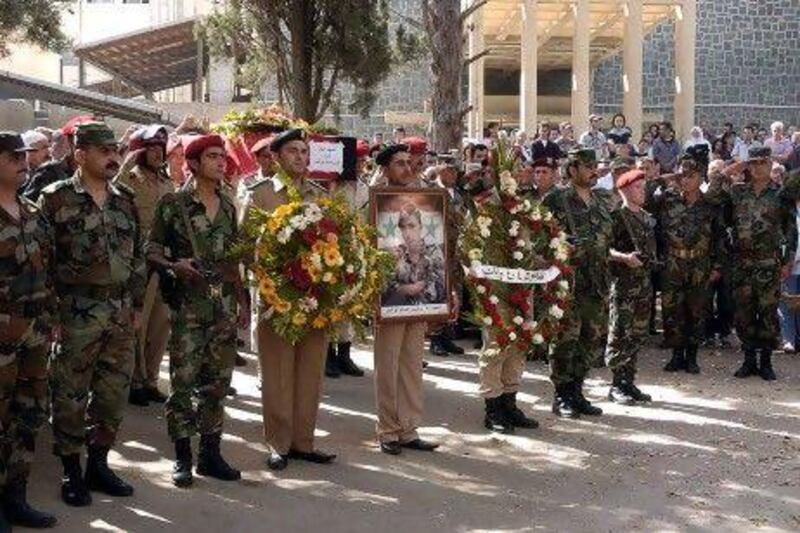BEIRUT // With the most lethal attack in Damascus in the 14-month uprising against the regime of President Bashar Al Assad, Syria has passed another threshold on the path towards full-scale civil war.
The International Committee of the Red Cross (ICRC) this week said the conflict in some parts of the country already meets its definition of civil war.
The fighting has been so intense in places such as Homs and Idlib province, that the ICRC believes it qualifies as localised civil war. Thurday's car bombings that left 55 dead and hundreds wounded brought that type of violence to the capital.
Kofi Annan, the UN Arab League special envoy to Syria, had also warned that such a conflict may be inescapable if his peace plan doesn't work.
"Right now the balance of power is still with the regime, but on the ground it is going towards civil war," said Elias Hanna, a Lebanese analyst and retired general.
Thurday's bombings at a busy intersection were not the first such attack in Damascus, but it was the deadliest.
Timor Goksel, a former spokesman and adviser for the United Nations Interim Force in Lebanon (Unifil), said such attacks would only "escalate the conflict".
"One of the main security services was targeted, which is the backbone of the government," he said. "Somebody out there is studying and deciding on targets. This is not haphazard, but well planned and seems to be better technically prepared than earlier bombings."
The last bombing to target the centre of the capital - which is still under the control of forces loyal to Mr Al Assad - was on April 27 when at least nine people were killed.
No one has claimed responsibility for Thursday's bombings. Both the government and the opposition blame each other.
Mr Hanna said the size of Thursday's explosions, the target, as well as the timing when UN ceasefire monitors are on the ground in Syria made the bombings significant.
"Damascus is the centre of gravity of the regime," he said. "If you want to execute this, you have to have the capabilities, which means whoever was behind it is a big organisation."
Violence from security forces has become the norm in some parts of the country, as anti-regime demonstrations have continued. Every day opposition groups detail regime violations of the UN-brokered ceasefire that was supposed to take effect on April 12.
More than 12,000 people, the majority of them civilians, have died since the uprising began, according to the Syrian Observatory for Human Rights. As the death toll has risen, there have been growing calls for the government to stop using violence against its people. The Syrian regime has maintained that foreign-backed terrorists are responsible for the bloodshed.
This week, UN secretary-general Ban Ki-moon spoke of more "innocent civilians dying, government troops ... in city streets, growing number of arrests and allegations of brutal torture". He also noted an "alarming" upsurge in the use of IEDs (improvised explosive devices) and other explosive devices.
Although the uprising began as peaceful protests, opposition to the regime has grown more militarised in the past several months. There is also concern about the presence of extremist militant groups in Syria, making the situation even murkier and further complicating the possibility of a resolution in the conflict.
Yesterday, the head of the main political opposition group, the Syrian National Council (SNC), said Thursday's suicide bombings appeared to have been carried out by Al Qaeda. Speaking during a trip to Tokyo, Burhan Ghalioun also linked the possible perpetrators to the Al Assad regime.
As the international community continues to grapple with how to deal with the Syria crisis, Mr Goksel said the country will continue to "slide towards civil war".
"But, I don't think the opposition or the state would be consciously pushing for civil war," he said. "We will see more such attacks, I'm afraid. Both sides are finding it difficult to talk to each other and in a conflict like this, a solution can only be found when the situation is ripe. The situation is not ripe yet, unfortunately."
[ zconstantine@thenational.ae ]
* With additional reports by the Associated Press





